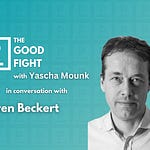Thanks for reading! The best way to make sure that you don’t miss any of these conversations is to subscribe to The Good Fight on your favorite podcast app.
If you are already a paying subscriber to this Substack or Persuasion, this will give you ad-free access to the full conversation with Timur Kuran, plus the exciting bonus episodes we have in the works! If you aren’t, you can set up the free, limited version of the feed—or, better still, support the podcast by becoming a subscriber today!
Timur Kuran is Professor of Economics and Political Science and the Gorter Family Professor of Islamic Studies at Duke University. He is the author of Private Truths, Public Lies: The Social Consequences of Preference Falsification and Islam and Mammon: The Economic Predicaments of Islamism.
In this week’s conversation, Yascha Mounk and Timur Kuran discuss how the phenomenon of people falsifying their preferences explains why revolutions are so unpredictable; how preference falsification operates in journalism and whether journalists get rewarded or punished for breaking taboos; and how we can move towards a society in which more people feel empowered to truthfully express their beliefs.
This transcript has been condensed and lightly edited for clarity.
Yascha Mounk: I first read your work when I was in graduate school and it continues to be so timely that we had to have you back on the podcast.
Let's start with the intuition that you started with all the way back in the ‘80s, which is that in retrospect, historians always think that revolutions are inevitable. And yet, contemporaries never managed to predict that these huge upheavals are about to happen. Why is that?
Timur Kuran: You're absolutely right that there are many massive explosions that nobody foresaw. The French Revolution is one example. There is not a shred of evidence that anyone foresaw it. The Russian Revolution of 1917 is another such example. Just several weeks before the February Revolution, Lenin was telling his audience that the great revolution was something that he would never see. The Iranian Revolution of 1979 which shook the Middle East and the world was unanticipated. The Arab Spring came as a huge surprise. Trump's election was something that was very poorly anticipated. Brexit came as a huge surprise.
So what is the common element in these? What causes these surprises? If people's preferences were written on their foreheads, we could see their preferences. We'd have no trouble seeing that more people are going to support Trump than Clinton, that people are about to take to the streets and topple the Romanov dynasty. But in fact, we are able to falsify our preferences. We are able to project a preference that is different from a private preference. Preference falsification is the act of misrepresenting one's preferences under perceived social pressures.
An intellectual might engage in intellectual preference falsification because he or she senses a possibility of being ostracized, being criticized, of being ridiculed for expressing approval of a certain theory or sharing certain interpretation. A gay person will engage in sexual preference falsification if he stays in the closet. Religious preference falsification occurs when a Jew in Spain five hundred years ago pretends to be a Christian for fear of the Inquisition. So this is a very common phenomenon. It is universal and it has very serious implications, very serious consequences.
Mounk: So help us think through what the implications of it are. Obviously, particularly in a dictatorship, which is the canonical case—but as you're pointing out in all these other kinds of contexts as well—we will intuitively understand why people might engage in preference falsification, right? If you're asked, “What do you think of Father Stalin?” to give your honest opinion might have very immediate negative consequences and so people are going to lie.
When you read dissidents like Vaclav Havel and The Power of the Powerless, which I know you cite in your work, they're thinking all about how preference falsification works and what the consequences are when people stop engaging in preference falsification.
Why is it that this element of preference falsification is so central to putting in motion the social process that can lead to a political revolution, to the downfall of a dictatorial regime? And why in particular can it explain this element of surprise? What is it about preference falsification that explains why it often takes people by surprise?
Kuran: Because people who are falsifying their preferences do not like to do it. There's a cost. Now, it will vary from context to context, from person to person, but there is a cost. We all would rather express our preferences honestly than falsify them. Now, if there are millions of people who dislike the regime within that society, they may be people who will abandon preference falsification, will start expressing their preferences honestly, will publicize their opposition to the regime if only some others go first. Well, the reason that big explosions come as a surprise is that we don't know what event it would take, what kind of trigger is necessary, to get the process started. To get some people to say enough is enough.
Mounk: One of the things I like about this account is that it doesn't make a very negative assumption about human nature. What you're doing in a sense is to say, “look, I'm not assuming that human nature is such that people like to lie and they'll do anything in order to get ahead. And they're just these pure utility-maximizing machines in the most simplistic way.” You're saying actually, preference falsification has a cost, right? Most people don't like having to lie about their political opinion. Most people don't like having to nod and smile at the dictator as he walks past. So they're motivated to cease engaging in preference falsification. That's actually one of the things that drives this process. But of course, whether or not they actually have the courage to reveal their real preferences depends on a whole bunch of social circumstances. So what are the social circumstances that explain whether or not people are going to start telling the truth? And why is it that if you reveal your true preference and your true preference is that you are actually secretly critical of a regime, why is that going to make me more likely to reveal my true preference as well?
Kuran: There's variation in courage. This is something that we see in daily life. That is just natural. With any given atrocity, there are some people who are going to speak against it or to criticize the regime for it or those responsible for it more readily than others. To your last point, there's safety in numbers. In a society where nobody is criticizing the regime, if I become the first person to criticize it, it could be that no one will follow. Or it could be that many people—thousands of people, tens of thousands, hundreds of thousands of people—will follow. But I do not know whether my taking the first step will give at least one other person the courage to be number two. And number two doesn't know whether there is at least one person among the hundreds of thousands of people who's ready to be number three. But it could be that there's no number four.
What is the result? The three people arrested by the regime are tortured, killed, whatever. There's a huge risk and there's variation in the risk that people are willing to take. This is why revolutions are unpredictable. In the case of the Arab Spring, what started it was a match that a street vendor lit to burn himself. He poured some gasoline on himself and he lit a match and self-immolated—that struck a nerve in enough Tunisians that they took to the streets and there were so many that took to the streets that that brought in tens of thousands of more, hundreds of thousands of more, and that toppled the regime. But we don't know exactly when such a self-immolation will strike that nerve.
Souhaitez-vous - ou quelqu'un que vous connaissez - avoir accès à tous ces articles et conversations en français ? Cliquez sur ce lien et activez “en français” sous Notifications ! 🇫🇷
Was Bouazizi the first person who self-immolated? No. There had been tens of other cases that did not lead to this. But in this case, this episode was caught on tape, it went viral, and it was just there were enough people in Tunisian society who could relate to it. So this is why so many big political explosions catch everyone by surprise.
Mounk: To what extent does individual agency matter and to what extent is history predetermined by much deeper, longer-standing structural transformations?
You can tell a story about the French Revolution or a story about the election of Donald Trump in 2016 that mostly focuses on one or the other. When you just look at the structural factors, they somehow fail to predict these outcomes. And so there's a weird puzzle here. What often happens is that the structural factors over-predict how often there's going to be that kind of revolution; sure, of course, there's deep discontent in France in the 18th century at various stages, but it wasn't clear that the deepest discontent was just before 1789. And, in any case, I'm sure there's a lot of discontent in North Korea today, but there hasn't so far been a revolution in North Korea. And so in order to explain that, you need these two additional elements. The first is what creates that spark? It could be a talented revolutionary leader who somehow manages to make people conscious of how angry they are, to spread information about how angry other citizens are, who's just strategic in how they are able to galvanize the grievances that may have existed for years before they arrived on the scene. But then the second element, which I think is really interesting, is that the specific distribution of preferences matters, that what you really need to create is this sort of revolutionary bandwagon. There might be societies in which, on average, people are more unhappy with the regime, but the distribution of their revolutionary thresholds (of when they might be willing to come out against the regime) is such that it just doesn't get going. Even though there's a lot of latent discontent, the couple of people who go out in the street never manage to bring everybody else out into the streets.
Kuran: And political scientists often debate where social change comes from. Does it come from the top, from elites? Do you need, within the governing body, a split among elites to get a revolution started, or does it come from below? Well, that itself is not predictable. In the Tunisian case, it was a member of the least privileged part of society, a street vendor who couldn't pay his bills, couldn't feed his family, that got the process started. There are, as you pointed out, in other cases, a leader who senses their grievances and manages to express them in a way to convince enough people that there is a better way forward. So it can come from the top, can come from the bottom, or it can be a combination.
Mounk: How have people tried historically to make sense of the origins of revolutions, and what do they get wrong? How do you think that your model helps us understand those social changes better?
Kuran: Historically, the historians, political scientists, and economists tried to look at the structural factors that altered society in a way that a sufficiently strong constituency was created to change societies and institutions, to revolutionize society. People look at commercial developments and changes in commerce that made merchants more powerful in England. And eventually they had to be brought into the social system. They had to be brought into parliaments. That’s when major change took place. It was a redistribution of power. People look at, in the case of Iran, the growing inequality that angers the working class—the repression of practicing Muslims on the part of the Shah created another constituency ready for a revolution.
The problem is that there are many, many other countries where the same conditions are present. Islam was being suppressed, there were big gaps in the wealth of capital owners and workers, and yet no revolution occurred. Structural conditions are relevant. If they don't exist, you're not going to get a constituency. You're not going to get a lot of people who are falsifying their preferences, you're not going to get these underground movements that are waiting for an opportunity to come to the surface. Those are important, but we can't know exactly the factors need to come together to create that spark and get the process going.
Mounk: So I've been thinking about your work in writing an essay recently. Let me very briefly state the thesis of the essay and then puzzle through whether or not you would actually agree with it.
You have these remarkable instances in which there is a very, very clear mainstream line in journalism. There's a certain kind of thing that you have to argue and believe in order to be in good standing. One of the ones during the pandemic, for example, was to reject out of hand the lab-leak theory, that the origin of COVID-19 may have been an inadvertent lab leak in a lab doing gain-of-function research that may have then set this virus free. This was loudly rejected by the most mainstream publications in the United States. Fact checking websites like PolitiFact described this as a debunked conspiracy theory. There were even senior scientists who were kicked off of Facebook and YouTube for making arguments that the lab leak theory may in fact explain the virus.
Möchten Sie meine Artikeln und Gespräche auf Deutsch direkt in Ihre Mailbox bekommen? Klicken Sie diesen Link und schalten Sie unter Notifications “auf deutsch” an! 🇩🇪
Later, a bunch of evidence started to accumulate—this evidence hasn't been conclusive: I think the substantive question is still very much open to debate—that the lab leak may have been at the origin of COVID-19. And even as this evidence was starting to accumulate, newspapers and magazines were continuing to ignore it completely. For the New York Times, it continued to be an absurd theory. And then suddenly, without there being an obvious instigating incident at that point, you have New York magazine do a big story that marshals some of that evidence. And the moment they do that—boom, boom, boom, the next three or four mainstream publications rush to publish similar articles. And within a few weeks, this theory goes from being the mark of a crank conspiracy theorist to more or less the mainstream opinion that we should take seriously. And so the question is, how does this sudden transformation happen? And there, all of the things you're talking about, preference falsification and then preference cascades, obviously are at play. Nobody wants to be the crank who's first out of the gate to talk about it. Then finally, when you realize you can talk about it, everybody else who's been holding back does so as well.
I think a lot of people who distrust the media will have the impression that there must be a conspiracy going on, that there's a memo from above, that somebody's telling these journalists what to say. But these seem to be very organic processes that can both produce the taboo and the vanishing of the taboo at seemingly arbitrary junctures.
So far, I'm assuming we're going to agree, but the argument that I'm making in the article is that in the grand debate about historiography between idealists and materialists and different-kinds-of-“ists,” we should give priority to what I’m calling the “dinner partyist.” That is, what actually explains people’s behavior is their worry about how they're going to be looked at during the next dinner party; and that that is a much bigger part of explaining how journalists messed up the origin of the pandemic, messed up Biden's mental state, messed up serious scientific debates about things like cross-gender hormones. And that is just what drives a lot of human behavior.
But that is slightly reductive, right? It's slightly deflationary. It's saying what people really worry about is their social standing and moments of social awkwardness and trying to fit in with their peers; whereas you're emphasizing the real consequences. So I'm recognizing there's a slight difference of emphasis at least. Which of these two do you think it is? Is it that people actually respond rationally to an accurate assessment of the punishments they're going to suffer, or is it the dinner partyist instinct, or is it somewhere in between?
Kuran: They're both relevant. And a dinner party is relevant partly because you don't want your close friends to stigmatize you. And when an academic gets stigmatized, that's going to affect their friendships as well. That's part of it. There's another way in which the dinner party is relevant. Dinner party conversations give you clues about changing private opinion, the distribution of private knowledge, how people are interpreting the world but not necessarily saying it. That can change. If you go to dinner parties over time and at many dinner parties the origins of COVID comes up, and you're a journalist, you start seeing a shift in the distribution of beliefs. More and more people are beginning to consider the lab leak explanation plausible, even if they're not all convinced. That then gives you an opportunity to become not just another crank who will be dismissed and will be stigmatized, but will be somebody who suddenly starts a cascade. And that's a way of building a reputation.
The United States is today a very polarized society. Most societies, in fact, today are very polarized. Those who pointed to not just the possible validity of the lab leak hypothesis, but who objected to certain COVID measures and gave reasons about the cost to closing primary and junior high schools being immense and not justified by the existing risks—many people on the left today agree to a considerable extent that there's truth in those positions. But the people who made them early on, made them at a time when acting would have made a difference, taking them seriously would have made a difference, have not been rewarded. You're absolutely right. Why not? Because they were immediately smeared as right-wing cranks and deplatformed, unfollowed by people in the mainstream, and they haven't recovered from that. Now, if we were not polarized, that wouldn't have happened. They would have gotten credit as someone who had gotten it right. And the people who had gotten it wrong would have lost some reputation. The people who smeared the people who got it right would have paid a price. But in our polarized society, this doesn't happen. There are things that people on the left get right and the people on the right get wrong. Eventually they come around to agreeing. It can happen in both directions.
Mounk: One of the things that's in the background of this conversation is the debate about cancel culture. And there's the kind of opening move that there is a kind of cancel culture within the left or the left-leaning establishment, that if you express certain kinds of views that might lead to you getting canceled. And one of the responses to that is, yeah, but you know what? The other side is canceling as well. They also engage in cancel culture.
Now, here's the question that I have about this. You wrote after Donald Trump was elected in 2016 that there is a possibility that a kind of preference cascade is going to lead to a really rightward shift of opinion in the United States, partially because people are revealing their real preferences about things like immigration, and partially because of a new form of right-wing political correctness inducing others to falsify their true preferences. That clearly hasn't happened. But under what circumstances does it happen? Where are there examples of societies in which politics is deeply polarized and it really splits society into two halves for a long time, and then suddenly one of those sides really wins and boom—the preference falsification transforms this from a divided society with two tribes that have strong forms of preference falsification within themselves to a society in which one side just wins; and now suddenly you have this hegemonic form of preference falsification that will be more reminiscent of a classic dictatorial regime and perhaps goes hand in hand with the establishment of a dictatorship. What does it take for one to turn into the other?
Kuran: I can give Turkey as an example where a massive shift did take place and—what we're seeing right now—a shift back toward the status quo ante.
From the 1920s all the way to the beginning of the 20th century, Turkey was ruled by politicians more or less committed to Turkish secularism. And Turkish secularism has involved not the separation of mosque and state, but rather, to put it rather crudely, the repression of Islam—the control of Islam by the state. This generated for many, many decades a lot of resentment. That resentment led to a populist movement led by people whose main appeal was that they wanted more religious freedoms and they wanted the state to be more responsive to openly religious people. Well that movement brought Erdogan to power at the beginning of the 21st century. Initially, he did things that appealed to a large majority. His genuine support grew. He won essentially free elections fairly. And that is an example of a movement that appealed to hidden preferences and managed to bring hidden preferences to the surface and use that to come to power and to solidify its power. But that movement became very repressive itself, turning Turkey into an effective dictatorship and since then religiosity has fallen massively and is continuing to fall in Turkey. A movement is developing to re-embrace secularism.
There was an attempt to unite the opposition against Erdogan. They lost the election. It was neither free nor fair, but according to the results, they got only 48%. A charismatic leader could have won by a landslide. And I think that this is just a matter of time that this will happen. The pendulum can swing when a movement comes to power by identifying a major source of preference falsification and allows people to publicize their preferences on something very important to a mass of people. They can then create circumstances that make other people hide their preferences and eventually create a constituency that will react.
Mounk: And do you think that could happen in a place like the United States? What has to be in place in society, even in democratic societies like the United States, for people to have to engage in preference falsification less? How can we build a society in which hopefully people can actually be true to themselves and as many people as possible can stop engaging in this kind of preference falsification?
Kuran: Many of our leaders in the past have created institutions to incentivize people to speak truthfully. Traditionally, universities have been quite welcoming of diverse opinions. They viewed diverse opinions and ideologies as necessary for the learning process through debates among people holding different views. One learns how to be critical of whatever one reads, one learns how to carry on discussions in a civil way with people you disagree with. This is central to a liberal education. Our leaders need to reinforce those institutions which have weakened in recent decades.
In the rest of this conversation, Yascha and Timur discuss the strand of his work that explains why the Middle East—which was one of the world’s richest and most developed regions in the year 1000—has since fallen behind economically and is now one of the least free. This part is reserved for paying members...
Listen to this episode with a 7-day free trial
Subscribe to Yascha Mounk to listen to this post and get 7 days of free access to the full post archives.













